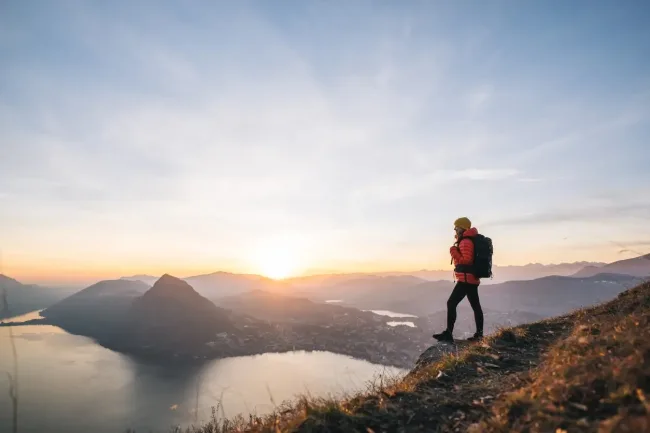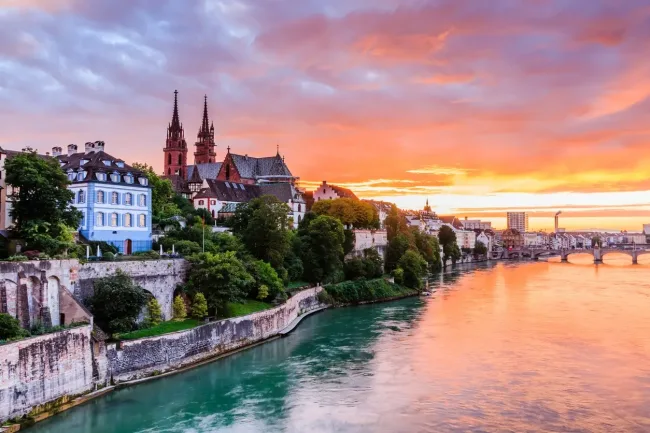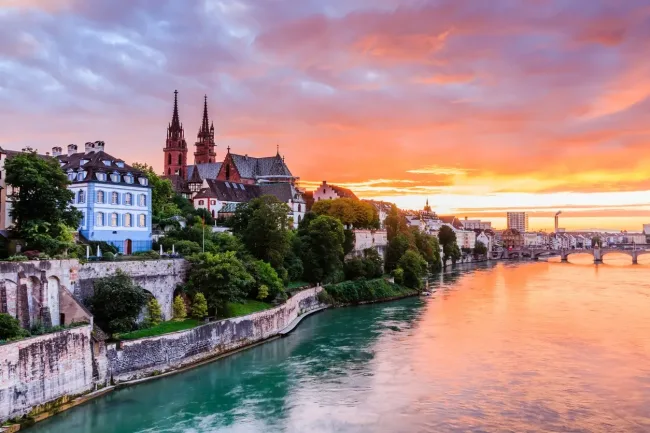
Switzerland
Welcome to Switzerland
Switzerland, where timeless landscapes meet world-famous chocolates and impeccable watchmaking. Your journey into this heart of Europe kicks off with a Swiss visa.
Here at iVisa, we've simplified the complexities of Swiss procedures, offering you a smooth path to your destination. Through our intuitive platform and mobile app, the captivating beauty of Switzerland is just a few clicks away.
From the bustling streets of Zurich to the tranquil Alpine villages, trust in us as you set out on this enchanting expedition to Switzerland and the rest of the Schengen Zone!

The Alps await: Your Swiss Visa options
New to globetrotting? Just as a chocolatier needs the perfect mold for Swiss pralines, you'll need the right visa to enter the country and savor the richness of Switzerland's diverse landscapes and culture.
Before you lace up your hiking boots and rehearse your German (or French, or Italian) let's delve into the visa choices that will pave your path to the Alps.
Switzerland Schengen Visa: Embrace the heart of Europe
Who is it for?
The Switzerland Schengen Visa allows eligible travelers to visit all 27 European countries in the Schengen Area for a temporary stay.
It’s offered to over 100 nationalities, including:
Afghanistan, Algeria, Angola, Armenia, Azerbaijan, Bahrain, Bangladesh, Belarus, Belize, Benin, Bhutan, Bolivia, Botswana, Burkina Faso, Burma/Myanmar, Burundi, Cambodia, Cameroon, Cape Verde, Central African Republic, Chad, China, Comoros, Congo, Côte D’Ivoire, Cuba, Democratic Republic of Congo, Djibouti, Dominican Republic, Ecuador, Egypt, Equatorial Guinea, Eritrea, and many others.
Who cannot apply:
-
Most European citizens, as well as citizens from the Schengen Area, don’t need this visa.
-
Travelers from visa-exempt countries such as the United Kingdom, the United States, Canada, New Zealand, Australia, Jan, South Korea, Hong Kong, Singapore, and everyone whose country has a visa-free agreement with Switzerland. Use our handy visa checker to see if fit into that agreement.
Purpose?
-
Tourism activities like sightseeing, holidays, and visiting family.
-
Business activities, including attending conferences, networking events, or client meetings (but not paid work).
-
Do temporary volunteer work or a language course.
Duration of stay?
This single- or multiple-entry visa is valid for at least six months and allows you to stay up to 90 days per entry within a 180-day period. The exact visa validity is determined by each individual circumstance and the government's decision.Learn more about the Switzerland Schengen Visa.
Switzerland ETIAS: A new way of travel
The ETIAS (European Travel Information and Authorization System) is not the same as a visa. It’s an online registration system, similar to the U.S. ESTA, for travelers from countries that don’t need a visa to enter the 30 European countries and four microstates. It helps to monitor incoming travelers and protect borders.
Who is it for?
The Swiss ETIAS is designed for travelers from countries that don't need a visa to visit the country and other participating countries for short trips. Citizens from over 60 visa-exempt countries must apply for ETIAS authorization, including:
The United States, Canada, Australia, New Zealand, Brazil, Japan, Brunei, Singapore, and more.
Who cannot apply?
-
Citizens from countries needing a visa to enter the Schengen Area.
-
EU/EEA/Swiss/Schengen citizens as they enjoy freedom of movement within the Schengen Area and don't need any visa or authorization.
-
Individuals with an outstanding entry ban.
Purpose?
Short-term visits for tourism, business, medical visits, or transit through participating countries.
Duration of stay?
The ETIAS authorization allows for short-term visits, typically up to 90 days within 180 days. The validity of the ETIAS is up to 3 years or until the end of the validity of the passport that you registered during the application, whichever comes first. Learn more about the Switzerland ETIAS.
Switzerland Airport Transit Visa: Non-Schengen bound
Who's it for? The Airport Transit Visa is available for travelers from the following countries:
Afghanistan, Angola, Bangladesh, Bolivia, Cameroon, the Central African Republic, Chad, Côte d’Ivoire, Cuba, the Democratic Republic of the Congo, the Dominican Republic, Eritrea, Ethiopia, Ghana, Haiti, India, Iran, Iraq, Mali, Mauritania, Nigeria, Nepal, Pakistan, the Philippines, the Republic of Guinea, Russia (if you are traveling from an airport located in Armenia, Azerbaijan, Georgia, Ukraine, Belarus, Moldova, Turkey, or Egypt), Somalia, Sri Lanka, Senegal, Sierra Leone, South Sudan, Sudan, Syria, or Turkey.
Purpose?
This visa allows you to fly from a non-Schengen country to Switzerland and wait in a Swiss airport's transit zone before taking off to another non-Schengen country. You can’t leave the airport transit zone with this visa.
Duration of stay?
There are three kinds of airport transit visas (ATVs):
-
One-way ATV: Lets you pass through a Schengen country once.
-
Return ATV: Good for two (one return) airport transits through one or two Schengen countries.
-
Multiple ATV: For multiple layovers in one or more Schengen countries.
Switzerland National Visa: Explore the essence of Swiss life
Who is this for?
If you are looking to stay in Switzerland longer than 90 days, you must get a national visa, including those from visa-exempt countries.
Purpose?
There are national visas for different purposes, such as studying long-term, family reunification, marriage in Switzerland, and more. The requirements differ for each specific purpose.
Duration of stay?
The validity of a national visa is valid for stays of more than 90 days, depending on the travel purpose.
Switzerland Work Permit: Broaden your work experience
Who's it for?
Professionals from outside the Schengen Zone and EU/EFTA area.
Purpose?
Those with specialist skills, like managers, specialists, or uni grads with extended experience, can work in Switzerland with this permit. This also includes self-employed people. There are only a limited number of work permits available each year. Those who are married to a Swiss national or resident don’t need a work permit.
Duration of stay?
This permit gives people the green light to work in Switzerland for an initial period based on their circumstances.

Switzerland Visa application process: Where Swiss bliss begins
Understanding the Switzerland Visa application can feel like decoding a Swiss watch. But don't worry, iVisa's got your back. Our online platform and app simplify the journey, making your application quicker and enhancing your chances of a thumbs-up!
How to apply for the Switzerland Schengen Visa
Getting your Switzerland Schengen Visa is pretty straightforward when applying through us:
Step 1: Complete the online form on our website or app with your personal details exactly as shown on your passport and travel info.
Step 2: Pay the processing fees with a credit or debit card, PayPal, or Venmo securely online. The government visa fees must be paid during your visa appointment.
You’ll be sent a complete guide with the next steps by email, from how to fill out the application form to what documents to bring when attending the visa interview!
Step 3: Attend the visa interview, provide your biometric info, and pick up your visa when approved!
Apply for your Schengen Visa today!
How to apply for the Switzerland ETIAS
We make getting your Switzerland ETIAS simple! Follow these three steps:
Step 1: Fill out the online form with your personal and travel details.
Step 2: Review your info, select your preferred processing time, and pay the processing fees with an accepted payment method.
Step 3: Upload any required documents, usually just a copy of your passport, and submit the application.
Once approved, you'll get your ETIAS confirmation by email. It will be linked electronically to your passport, but we recommend printing the confirmation just in case.
Please note that the ETIAS is not yet implemented. Check back frequently to find out when exactly you’ll need to register for your ETIAS to visit Switzerland.
How to apply for the Switzerland Airport Transit Visa
Apply for the transit visa by reaching out to your nearest Swiss embassy or Consulate. The application process typically follows these steps.
Step 1: Fill out the application form with your personal and travel itinerary. Gather all required documents, such as your flight confirmation.
Step 2: Review your info and pay the visa fees.
Step 3: Pick up your passport with your transit visa as instructed by the embassy or consulate.
Once approved, you'll find the validity on your visa sticker or confirmation.
Please note: We currently do not offer the Switzerland Airport Transit Visa. To apply, please contact your nearest Swiss Embassy or Consulate.
How to apply for a Switzerland National Visa
The application process for a long-stay national visa can take some time, but once you’ve gathered all requirements, you should face no issues getting it:
Step 1: Make sure to gather all supporting documents as listed by the Swiss authorities, before applying.
Step 2: Complete the application form and pay the fees. You may have to attend an interview and provide your biometric info, such as fingerprints and a photo.
Step 3: Once your application is approved, your visa will be placed in your passport.
Please note: We currently do not offer Switzerland National Visas. To apply, please contact the nearest Swiss Embassy or Consulate.
How to apply for a Switzerland Work Permit
A work permit can be obtained by gathering specific information about your employment in Switzerland and applying at a Swiss Embassy or Consulate near you:
Step 1: Make sure to gather all correct documents as instructed by the Swiss authorities before you apply.
Step 2: Fill out the application form and pay the fees. You may have to attend an interview and provide your biometric information, such as fingerprints and a photo.
Step 3: Once your application is ready, you may still have to pick up a residence card or permit when you’ve arrived within a certain period.
Please note: We currently do not offer Switzerland Work Permits. To apply, please contact the nearest Swiss Embassy or Consulate.
Switzerland entry requirements
Prepping for your Swiss adventure? We understand that navigating the entry rules can be a tad daunting. But here's the good news: We're with you at every turn.
Consider these guidelines your roadmap to a smooth landing in Switzerland's wonderland. Let's gear up and ensure you're ready for the trip of a lifetime!
| Australia eVisitor | Australia ETA | Australia Incoming Passenger Card | Australia Visitor Visa | Australia Student Visa | |
|---|---|---|---|---|---|
| Valid Passport | ✓ | ✓ | ✓ | ✓ | ✓ |
| Travel Itinerary | ✓ | ✓ | x | ✓ | ✓ |
| Proof of Sufficient Funds | ✓ | ✓ | x | ✓ | ✓ |
| Return or Onward Ticket | ✓ | ✓ | x | ✓ | ✓ |
| Health and Character Requirements | ✓ | x | x | ✓ | ✓ |
| Biosecurity and Customs | ✓ | ✓ | x | ✓ | ✓ |
| Proof of Accommodation | ✓ | ✓ | x | ✓ | ✓ |
| Invitation Letter (if applicable) | x | x | x | x | ✓ |
| Confirmation of Enrollment (CoE) | x | x | x | x | ✓ |
| Overseas Student Health Cover (OSHC) | x | x | x | x | ✓ |
| Statement of Purpose (SOP) | x | x | x | x | ✓ |
Health information for travelers to Switzerland
Switzerland is renowned for its top-notch healthcare system, and this extends to travelers as well. Here's a quick overview of the health facilities for travelers in Switzerland:
| Requirements | Switzerland Schengen Visa | Switzerland ETIAS | Switzerland Airport Transit Visa | Switzerland National Visa | Switzerland Work Permit |
|---|---|---|---|---|---|
| Valid Passport | ✓ | ✓ | ✓ | ✓ | ✓ |
| - Must be valid for at least six months from the departure date and have two blank pages. | |||||
| - If your passport is expiring soon, check out our passport renewal service to see if we can help you get a new one before your trip. | |||||
| Travel Itinerary | ✓ | X | ✓ | ✓ | ✓ |
| - Accommodation confirmation to prove where you’ll be staying. | |||||
| - Return flight ticket. | |||||
| Proof of Sufficient Funds or Employment | ✓ | X | ✓ | ✓ | ✓ |
| - Evidence like bank statements or a declaration from a sponsor showing adequate funds for the stay. | |||||
| - For some visas, you must show you have regular income and must provide proof of employment. | |||||
| Passport Photo | ✓ | X | ✓ | ✓ | ✓ |
| - A recent photo of yourself for your residence card or identification purposes. | |||||
| - If you don’t have one, use our handy digital photo service to get one from the comfort of your own home! | |||||
| Proof of Medical Insurance | ✓ | X | x | ✓ | ✓ |
| - You need health or travel insurance covering medical expenses in Switzerland, designed for your trip’s purpose and duration. | |||||
| Criminal Background Check | ✓ | X | x | ✓ | ✓ |
| - Proof of a clean criminal record. | |||||
| - You can usually get this at a police department in your country of residence. | |||||
| Proof of Relationship | ✓ | X | x | ✓ | ✓ |
| - If someone is coming with you as a dependent, submit proof of your relationship. | |||||
| - This could be a marriage certificate or birth certificate. | |||||
| - It could also involve children, parents, or siblings, proving family ties. | |||||
| Letter of Acceptance or Approval | x | X | x | ✓ | ✓ |
| - From your educational institution, employer, or the responsible Swiss authority. |
Gearing up for a Swiss getaway? Being prepared and in the know paves the way for a hassle-free and epic journey through Switzerland!
Get assistance from your embassy in Switzerland
Knowing how to contact your home country's embassy or consulate in Switzerland is like having a safety net for those "what if" scenarios. Whether you're from Switzerland and globetrotting, or you're an international traveler heading to Switzerland, keep that embassy info on hand.
Swiss travelers abroad: Passport missing? Facing an emergency? Your nearest embassy is your go-to when you need emergency support or useful tips.
International travelers in Switzerland: Experiencing an emergency while in Switzerland? Find your home country's embassy for guidance.
Connect with ease:
-
Websites: For comprehensive details, visit the official government websites, be it for contact details or available services.
-
Phone: If there's an urgency, navigate to the "Contact Us" segment of the closest embassy's site and give them a call. They typically offer a round-the-clock emergency line.
-
Email: For less immediate concerns, an email is efficient for inquiries or arranging meetings.
-
In-person: On certain occasions, a direct conversation can simplify matters. Don't forget to book an appointment if needed.

 United Kingdom
United Kingdom
 United States
United States
 Japan
Japan
 Canada
Canada
 Mexico
Mexico
 Vietnam
Vietnam
 India
India
 Brazil
Brazil
 Australia
Australia
 New Zealand
New Zealand
 Indonesia
Indonesia
 Thailand
Thailand


